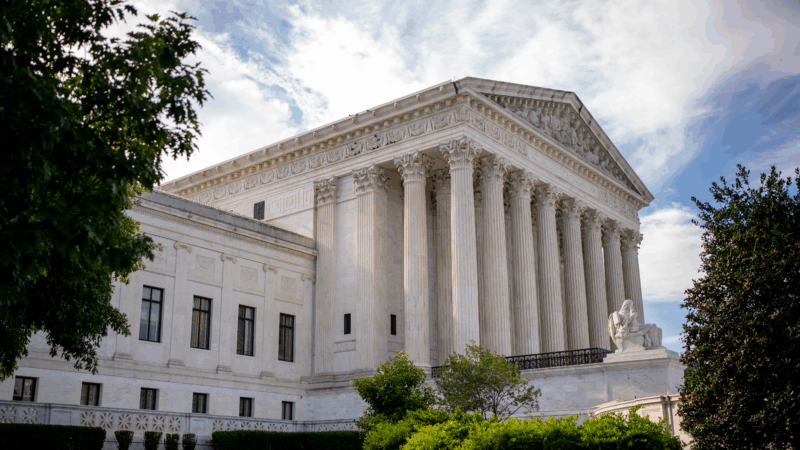Trump enacts a 1790s law to target ‘alien enemies’ for detention and deportation
In his latest move to clamp down on illegal immigration and immigration more broadly, President Trump has filed a presidential action invoking the Alien Enemies Act of 1798, a seldom-used law that gives the president authority to detain or deport nationals of an enemy nation during wartime. It’s only the fourth time in American history a president has used the act — and the first since World War II.
The directive targets members of Tren de Aragua, a Venezuelan prison gang, and authorizes expedited removal of all Venezuelan citizens 14 and older, deemed to be members of the organization, who are not U.S. citizens or lawful permanent residents.
According to the presidential action, those people “are liable to be apprehended, restrained, secured, and removed as Alien Enemies.”
An executive action signed in January that designated Tren de Aragua as a foreign terrorist organization paved the way for the direct removal of its members from U.S. territory under the Alien Enemies Act, declaring they, along with MS-13, a gang with origins in El Salvador not included in Saturday’s action, “present an unusual and extraordinary threat to the national security, foreign policy, and economy.”
The announcement from the White House came just hours after a federal judge issued a temporary restraining order against the removal of five Venezuelan men for 14 days under the expected invocation of the act. An emergency hearing on the matter will take place Saturday evening.
The expedited removal process allowed under the act means that those subject to the president’s declaration would not go through the normal immigration court process, or be able to claim asylum. Advocates fear that invoking the act would also open the door for targeting and deportations of other individuals regardless of their status or criminal records.
“There’s nothing in the law itself that would require it to be limited to undocumented individuals or individuals who have committed crimes,” said Katherine Yon Ebright, counsel on the liberty and national security team at the center-left Brennan Center for Justice. “It’s not about legal status, consistent with the idea that it’s a wartime authority, not an immigration authority.”
It is also unclear how the inclusion of minors in the president’s action Saturday will play into legal challenges.
Trump has laid the groundwork to bring back the old law
Trump threatened today’s move since his early days on the campaign trail in 2023. In several rallies he vowed to “invoke the Alien Enemies Act to target and dismantle every migrant criminal network.” Immigration was a top theme throughout his campaign, during which he also promised the largest deportation actions in the country’s history.
At the Republican National Convention last July, the GOP committed to “invoke the Alien Enemies Act to remove all known or suspected gang members, drug dealers, or cartel members from the United States,” as a part of the party platform.
Trump has long argued that the act would give “tremendous authority” for immigration law enforcement. Detentions and deportations conducted through the act would not go through the immigration court system, and would allow Trump to bypass the traditional deportation process, according to Morgan Bailey, who served as deputy chief of staff at the U.S. Citizenship and Immigration Services during Trump’s first term, which includes appearing before a judge.
“Under the Aliens Enemies Act, this aspect of going through each of these steps is abbreviated, and there isn’t an aspect of showing or allowing the individual to have their day in court before the immigration judge,” Bailey said. “Rather, the person could be deported simply based upon the aspect of whether or not they are a national of a particular country.”
Legal challenges to enforcing the Act remain
The Alien and Enemies Act is the last of the four Alien and Sedition acts, the other three which have been repealed or expired. It allows the president to detain, relocate or deport non-citizens from a foreign nation or government considered an enemy during wartime.
The last time the act was invoked was WWII, during which 31,000 suspected enemy aliens of mostly Japanese, Italian and German descent were placed in internment camps and military facilities. The law requires war to be formally declared — which only Congress has the authority to do.
George Fishman, senior legal fellow at the conservative Center of Immigration Studies and former deputy general counsel at Department of Homeland Security during the first Trump administration, has been a strong proponent of the act. Still, he has acknowledged the legal challenges in defining illegal immigration as an invasion and labeling gangs as foreign nations.
“It’ll be an uphill struggle to get the federal court to sign off on its use,” Fishman said. “Federal courts have never up until now bought off en masse illegal immigration as getting the definition of invasion under the US Constitution’s use of the term.”
But he said that the question of invasion and predatory incursion could still be reasonably argued in court.
Immigrant rights groups, including the American Civil Liberties Union, are already fighting the effort and have urged local governments to put in place measures that limit the use of local resources to assist with immigration enforcement.
Legal experts also say there is legal precedent that may make this difficult as well.
Ebright said that historical efforts to make wartime powers into peacetime immigration enforcement have never succeeded in the courts.
“Challenges will come from the nonprofit sector, advocacy space as well as from states…and very well could result in the courts striking down an effort to use the Alien Enemies Act,” Ebright said. “But it is not completely clear what the courts will do.”
Republicans say Clintons risk contempt of Congress for not testifying on Epstein
House Republicans are seeking testimony as part of their investigation into convicted sex offender Jeffrey Epstein. The Clintons say they've already provided in writing what little they know.
FTC accuses AI search engine of ‘rampant consumer deception’
Federal officials say a company that operates hundreds of landing pages for AI answers is running an operation that has duped thousands of users, who were unable to stop costly monthly charges.
‘My role was making movies that mattered,’ says Jodie Foster, as ‘Taxi Driver’ turns 50
Foster was just 12 years old when she starred in the 1976 film. "What luck to have been part of that, our golden age of cinema in the '70s," she says. Her latest film is Vie Privée (A Private Life).
Supreme Court appears likely to uphold state bans on transgender athletes
To date, 27 states have enacted laws barring transgender participation in sports.
Keep an eye out for these new books from big names in January
The new year begins with a host of promising titles from George Saunders, Julian Barnes, Jennette McCurdy, Karl Ove Knausgaard and more. Here's a look ahead at what's publishing this month.
Want to play a Tiny Desk concert? The 2026 Contest is now open for entries
The 2026 Tiny Desk Contest, our annual search for the next great undiscovered artist, is now officially open for entries.







